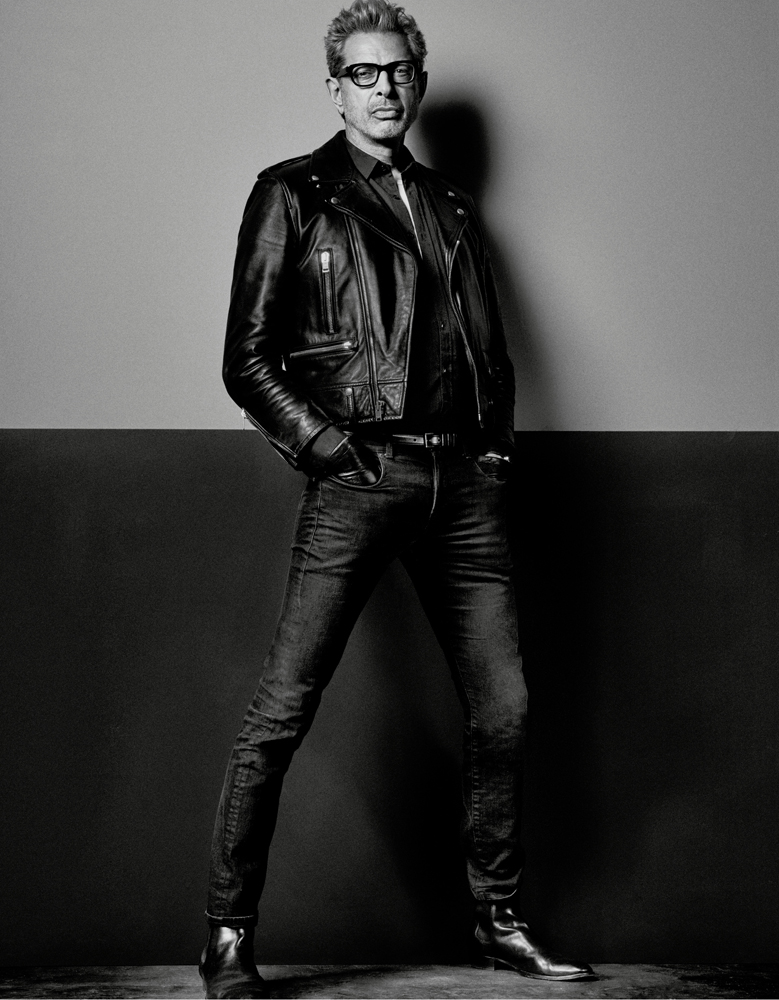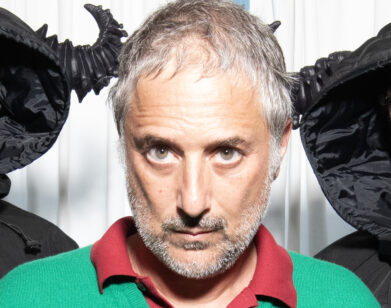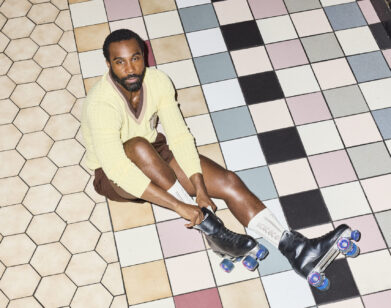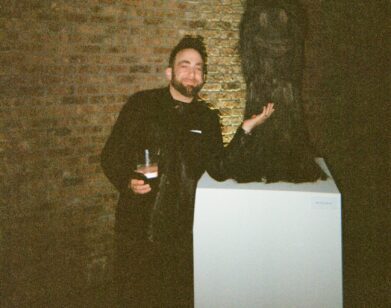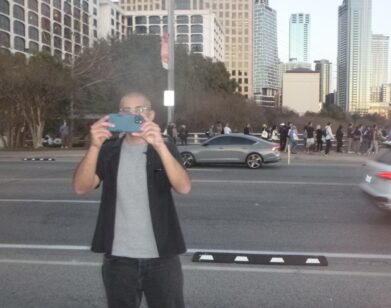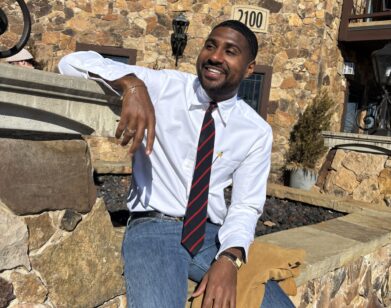Jeff Goldblum
The voice. That delivery. Those … ooh, signature moments of, of, of seemingly stumbling as he, uh, uh, gathers his thoughts and then launches into a cascaaaade of thrillingly articulate and comic lyricism … Uh, uh, yeahhhh, Jeff Goldblum is the best. Maybe even too good. Like other famously distinctive performers—the Walkens of the world—Goldblum is probably, definitely, underrated as an actor: Something so deliciously delectable can’t also be good for us, right? But we needn’t think too hard about it; we just know he is a delight to watch.
And the feeling seems to be mutual. Since his earliest days, working with Robert Altman, Paul Mazursky, Philip Kaufman, and Woody Allen in the ’70s, through his breakout in Lawrence Kasdan’s artful dramedy The Big Chill in 1983, Goldblum has always seemed to be having the absolute time of his life. Whether he is playing the oddball leading man in David Cronenberg‘s The Fly (1986) and the two Steven Spielberg-directed Jurassic Park movies (1993 and 1997), or a vividly eccentric character in Wes Anderson’s movies and in the alien attack epic Independence Day (1996)—or, even, during his weekly gigs in Los Angeles with his jazz band the Mildred Snitzer Orchestra—Goldblum looks to be ever-in-the-moment, giddily improvising, and digging the way it’s going down.
And why not? At 63, with a new young son, domestic bliss, and at least one mega blockbuster on the horizon—Independence Day: Resurgence hits theaters on, well, right around Independence Day (news of his upcoming role in Thor: Ragnarok came at press time)—Goldblum is like an advertisement for the good life. As he tells his friend, the musician, writer, and actor Fred Armisen, it really is that good.
FRED ARMISEN: Where are you, Jeff?
JEFF GOLDBLUM: I’m in L.A. at my house. Where are you?
ARMISEN: I’m in Santa Monica at a hotel. We’re doing a writers’ retreat for Portlandia. I broke away for a little while.
GOLDBLUM: I think you live near where I played last night at Rockwell in Los Feliz, where we play every Wednesday. And you’re cordially invited if you’d ever like to come by. I play that jazz gig every week when I’m in town.
ARMISEN: That is so exciting! Yeah, I just moved to Los Feliz, or Los Feleez, or however they pronounce it. That’s how it should be; I should be able to go down the street and watch you play. That’s one of the great things about Los Angeles, that people just play music, and it’s all very welcoming and welcomed.
GOLDBLUM: More than New York, even? I mean, when we played in New York, we played at the Carlyle Hotel, but that was a different thing. And in Portland, I’m sure you can play every place you go. But I like it out here. And I particularly like that section of L.A.—Los Feliz and all around there. So, this retreat, you’re writing the next season?
ARMISEN: Yeah. It’s a nice way of rounding everybody up—Jon Krisel, Carrie, our other writers, Karey Dornetto, Graham Wagner … How’s your life going? How is your family? What is your daily life like?
GOLDBLUM: Well, we played the gig last night—which is my one later night. Usually I go to bed early because I have this young son, who was born on the Fourth of July this last year, named Charlie Ocean Goldblum. And he has a very structured routine. We, the three of us, get in the bathtub at about 6:20, and then we usually order food in because our kitchen is being remodeled right now—really, the whole house has been benefitting from our nesting instinct. So every night we’re ordering in from Pace … Do you know Pace, up in Laurel Canyon? That’s our go-to place these days. Last night I ordered the chicken parmesan, which was a special, and she got this tuna thing and this cauliflower vegan soup—very nice. But last night I gave him a bath and went off to play the gig from 8:30 to 11, came back, and went to bed later. Usually, we go to bed at like, 8, 9 o’clock, get up when he gets up, at 6:45ish, 7 o’clock. I get up, feed the dog, and take the dog out. We’ve got a big, red-haired standard poodle named Woody Allen. We call him Woody mostly. And then the baby gets changed and fed, and then we sit in the playroom. He’s got a little safe-area playroom where we just watch him play and develop. He’s starting to stand up and just started to say “da-da” this last week. He’s very thrilling. Then I sit with him on my lap and we play piano a bit. And then I get my stuff done. I usually run through an hour-ish of piano and singing time for me. It’s not unrelated to what we do at the gig. And then I’ve got a kind of a gym here in the house, and I do my routine and try to get my 12,000 steps—the beginning, at least, of my 12,000 steps, because we’ve got a couple of treadmills side-by-side. Sometimes we walk around the neighborhood, too, with Charlie and with the dog. And that’s about it. That’s kind of my homework. Then I go over my script. I’m working on a movie that I can’t really talk about because they haven’t said what it is; the people doing it haven’t said, but I work on my part every day. I like to, if I have enough time, not cram anything, but just kind of touch it every day. That’s my homework, and then I’m free. And now, very specially, I’m talking with you.
ARMISEN: I can hear how happy you are. Like, you like this. What seems like a routine is actually very varied. It’s this really colorful life. And I’m very happy for you. When you’re playing music, do you feel like it’s a separate part of your brain? Do you do it for the audience who’s there? Do you get better every night?
GOLDBLUM: I like the idea of being a student, and I play with very good musicians. So playing with them allows me to get better. My aim is to get better, but I really love it for its own sake. I’ve got an old Fender Rhodes that I like a lot, and then a Yamaha baby grand. I can’t pass them without playing. I just like to play, and it changes my day. Thank goodness my mom gave us all lessons, because it really has changed my life. This last, I don’t know, 15, 20 years of playing out and about has been a new chapter and a horizon-enhancer of life and music. It’s very interactive and it’s improvisational. We really don’t rehearse as a group, but I get these great musicians, and we jam, and I don’t know what we’re going to play until they start to play it. And then I do a lot of talking, playing with the audience, but I don’t really know what that’s going to be. Somebody kind of feeds me cold. He gives me these kind of cold games that I play with the audience or quizzes that I do with them. We worked out this way to have maximum surprise for me. So the whole evening is a very enjoyable—for me and, it seems, for them—kind of a group “happening.”
ARMISEN: That’s wonderful.
GOLDBLUM: You’re a drummer, and you have that group. I’d love to hear you play, and I’d love to play with you. I know Devo was an early inspiration to you. Have you been over to Mark Mothersbaugh’s studio on Sunset—you know that one that’s kind of green, looks like the Forum?
ARMISEN: I’ve been! Mutato Muzika. It’s so cool. It’s like a little playground of instruments and keyboards and all that.
GOLDBLUM: We had a great time there. I was just Wikipedia-ing you today, and I never knew that your original name was, uh, how do you say it? Fereydun?
ARMISEN: Yes! Fereydun, that’s my dad’s name. My grandmother, my dad’s mom, when she was pregnant, she was dating a man from Persia, a Persian gentleman. It wasn’t his child, but he was still very supportive and said, “Hey, this is a great name,” and so it stuck. So that’s what she named him. I was a junior. He called himself Fred, and then I called myself Fred, but only now I’m thinking, “Boy, I should’ve held on to that name.” But in a way, the name is still a part of me, so who cares what’s on paper?
GOLDBLUM: Sometimes I think that people’s characters get forged, at least in part, from their names, and it’s interesting that you have this exotic, unusual name—I’ve never even heard it before. Maybe that’s why you’re as special as you are. I mean if Crispin Glover were named, you know, John Glover, he might not have become the interesting and unusual fellow that he is.
ARMISEN: I love that theory. It’s like an early imprint on everything. And, as a side note, now that we’re talking about Crispin Glover, what a great person we have in our lives—Crispin Glover. That is the kind of person that I’m just happy exists. I’ve always been immediately entertained by him.
GOLDBLUM: Definitely. I think my favorite Crispin Glover moment is the bit in Wild at Heart [1990] where Laura Dern’s character says she found Glover’s character, put “one big cockroach right on his anus.” [both laugh] I like that line. Hey, but you played drums for the Blue Man Group, and when I worked with Tim and Eric [on Tim and Eric Awesome Show, Great Job!] they did that sketch about the GoldBluMan Group, so we have kind of a connection there. And we both did Crank Yankers.
ARMISEN: We’re connected. We’ve got a few bridges. I have a question for you about being on set. What is the part of the day that you feel is the most work? Meaning, is it being on camera? Is it in between shots? For me, I’ll say it does feel like the in-between stuff is the work part of it. What’s a permanent part of it where you’re like, “Yeah, this is the work part of it”?
GOLDBLUM: I think it changes. I’m thinking about this Independence Day movie this last summer, and sometimes the days would go long—like, 16-, 17-hour days. And so if my energy flags, it feels like work to manage it and to figure out if I need to take a nap or sit down or eat some more—because, you know, I like to eat every two or three hours. And they give you that breakfast, which I love—boy, do I love that truck. That’s a very nice situation. And the lunch is usually good. But sometimes there’s five or six hours in between, so figuring out how to procure meals gets a little work-y. But, most of the time, as much as I’ve done it, it always feels like a special privilege that I’m terrifically grateful for. I think of it as work-slash-play, because it’s the work of play. It’s a playtime. And I like how time goes on set. It’s almost like time on an airplane or something where people are together. It’s a different, very trippy kind of time, I find, because you’re together in imaginary time where you’re out of time. You’re called upon to be present and honor what can happen in the moment. And the whole day can go like that. The whole day can be a kind of meditation.
ARMISEN: That’s a good comparison. Like being on a flight. And I agree with you so much about the gratitude of it. I still feel lucky whenever I hear a director say, “Action!” Because then I think, “Whoa, I’m really in the movies. This is a real thing happening.” I’ve never not been enthralled by that. I still love it. I still love hearing it, and I feel really lucky all the time.
GOLDBLUM: We have another connection. I went to the White House Correspondents’ Dinner, and for the first time, I met Barack Obama!
ARMISEN: No way!
GOLDBLUM: He was lining up with Michelle; the two of them were making themselves available, very generously. It seems like a challenging part of the job. A hundred or so people in this room, and they stayed for an hour or so and took a few moments with each one and took a picture. I love them, but, of course, you do great impersonation of him. Have you met him?
ARMISEN: Yeah. It was the same situation a couple of years ago: the White House Correspondents’ Dinner. It’s really amazing that, in your life, you’ve met a president. It’s a pretty huge life experience. I’m imagining you talked to him a little bit?
GOLDBLUM: A little bit. I talked to Bill Clinton at one point. I think it is an amazing thing, and I don’t take that for granted either. It’ll be a highlight of my life. And speaking of your impersonations, I was thinking of Prince, of course.
ARMISEN: Aww.
GOLDBLUM: I got a chance to see him once. Oh boy, I miss him. I liked that last memorial show where they showed a compilation of your Prince impersonations. Jeez, I loved what you did. Did you get a chance to meet him?
ARMISEN: I did. I met him and I’m so glad I did. I saw him play many, many, many times. He’s been a huge part of my life since I was in my first year of college. I never thought it would happen. I wasn’t prepared for the day when I would get news like that. I’m still in a little bit of disbelief. I’m still not over it. His life felt very present tense to me.
GOLDBLUM: I never saw him play live. I only saw him on one occasion; it was at some awards banquet. I was at a table with Paul Rudd, whom I really like. We were chatting away. And a hush came over the room as Prince floated by our table within arm’s reach. Paul Rudd and I looked at each other and were wide-eyed and speechless. It was breathtaking. I adored him. I wish I’d seen him live, and I never talked to him, but that happens. It’s happened more than once recently where somebody dies and you go, “Oh, I didn’t know they were going to die! I wish I’d done this or that.” But I guess there’s something teachable in that: Anybody can die, everything is fleeting, and you’ve just got to make sure that you catch up on what you can catch up on, right?
ARMISEN: I know. It’s all so fragile. Whatever the circumstances were, he was still a functioning, touring musician. He wasn’t 80 and, you know, that’s how easily it can all happen.
GOLDBLUM: I had a brother who died early on—he was 23 when I was 19. And, boy, I certainly didn’t expect that. That was utterly shocking. Recently, Garry Shandling died and I loved him. We were pals and I was shocked that he died.
ARMISEN: Aw, Jeff, I’m so sorry. I’m remembering your scene from Larry Sanders just as you were talking about Garry—I think you were both trying to date … Was it Gina Gershon? I think you were giving her a foot massage. [laughs]
GOLDBLUM: You’re right! It was Gina Gershon.
ARMISEN: The both of you were smiling and trying to sort of lay down the boundaries, God, that was so good! This was before I knew you, and I was already affected.
GOLDBLUM: He was wonderful to work with, and that was a fun show. I just saw Gina Gershon recently, on a boat trip. Paul Allen has these big yacht trips—I went once, 15 years ago or something like that, to Alaska and then on another one to Saint Petersburg. But a few weeks ago, we went for ten days to Vietnam and Malaysia and Singapore, and Gina Gershon was there and a bunch of other interesting people. He’s a musician, Paul Allen, and we jammed with him a couple of nights. Stevie Wonder came on the boat, and Rufus Wainwright was there, and Chrissie Hynde was there and played. Jim Watson was there, one of the guys who discovered the structure of DNA and who I played in a movie [The Race for the Double Helix, 1987]. Daniel Dennett, one of the esteemed writers on atheism, was there, very interesting guy. Quentin Tarantino was on the boat, Tom Stoppard. It was a very interesting experience. And Gina Gershon and I talked about Garry.
ARMISEN: That sounds incredible. I can’t believe this. Did you all sleep on the boat? Did you all eat breakfast on the boat?
GOLDBLUM: Yes! Paul Allen rented this whole yacht, and everybody had a little cabin, and we slept over there for ten days straight, and then would anchor for a couple of days, and we would have little excursions into Ho Chi Minh City and different places like that. It was really incredible. And then with that group of people! We’d have dinner and then have a jam session every night with these different musicians. The last night was with Stevie Wonder. On the boat! Because these big yachts are, you know, five-star hotels. They not only have a gym and all kind of things, but they’d have lectures about where we were going and a big theater room, and then a kind of an after-hours place where I played, and where Stevie Wonder, after he did his show, also played. It was an amazing, trippy kind of blast.
ARMISEN: It sounds bigger than a yacht.
GOLDBLUM: It was like the Love Boat. I guess it’s not a yacht—it’s a cruise ship; 200, 300 people were on it. You should’ve been there. You would’ve had a high time, I’ll bet. They would’ve loved to have you there. We could’ve played music, oh boy. And the people, the conversations … incredible.
ARMISEN: Your whole life sounds so great. I don’t know anyone else who loves performing as much as you do. And the love is always evident. I always see it in your performances.
GOLDBLUM: I plead guilty.
FRED ARMISEN IS THE CO-CREATOR OF THE PEABODY-WINNING IFC SERIES PORTLANDIA.

